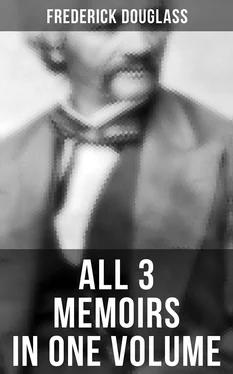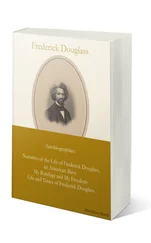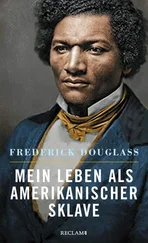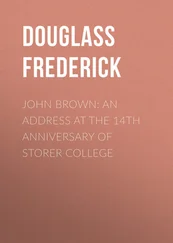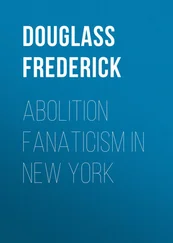Frederick Douglass - Frederick Douglass - All 3 Memoirs in One Volume
Здесь есть возможность читать онлайн «Frederick Douglass - Frederick Douglass - All 3 Memoirs in One Volume» — ознакомительный отрывок электронной книги совершенно бесплатно, а после прочтения отрывка купить полную версию. В некоторых случаях можно слушать аудио, скачать через торрент в формате fb2 и присутствует краткое содержание. Жанр: unrecognised, на английском языке. Описание произведения, (предисловие) а так же отзывы посетителей доступны на портале библиотеки ЛибКат.
- Название:Frederick Douglass: All 3 Memoirs in One Volume
- Автор:
- Жанр:
- Год:неизвестен
- ISBN:нет данных
- Рейтинг книги:3 / 5. Голосов: 1
-
Избранное:Добавить в избранное
- Отзывы:
-
Ваша оценка:
- 60
- 1
- 2
- 3
- 4
- 5
Frederick Douglass: All 3 Memoirs in One Volume: краткое содержание, описание и аннотация
Предлагаем к чтению аннотацию, описание, краткое содержание или предисловие (зависит от того, что написал сам автор книги «Frederick Douglass: All 3 Memoirs in One Volume»). Если вы не нашли необходимую информацию о книге — напишите в комментариях, мы постараемся отыскать её.
"Narrative of the Life of Frederick Douglass" is s generally held to be the most famous of a number of narratives written by former slaves during the same period. In factual detail, the text recount Douglass's life as a slave and his ambition to become a free man and is considered to be one of the most influential pieces of literature to fuel the abolitionist movement of the early 19th century in the United States.
My Bondage and My Freedom is the second of three autobiographies written by Douglass, and is mainly an expansion of his first (Narrative of the Life of Frederick Douglass), discussing in greater detail his transition from bondage to liberty.
Life and Times of Frederick Douglass is Frederick Douglass' third autobiography in which he gave more details about his life as a slave and his escape from slavery in this volume than he could in his two previous autobiographies.
Frederick Douglass (1818 –1895) was an African-American social reformer, abolitionist, orator, writer, and statesman. After escaping from slavery in Maryland, he became a national leader of the abolitionist movement in Massachusetts and New York, gaining note for his dazzling oratory and incisive antislavery writings.
Frederick Douglass: All 3 Memoirs in One Volume — читать онлайн ознакомительный отрывок
Ниже представлен текст книги, разбитый по страницам. Система сохранения места последней прочитанной страницы, позволяет с удобством читать онлайн бесплатно книгу «Frederick Douglass: All 3 Memoirs in One Volume», без необходимости каждый раз заново искать на чём Вы остановились. Поставьте закладку, и сможете в любой момент перейти на страницу, на которой закончили чтение.
Интервал:
Закладка:
Mr. Covey's forte consisted in his power to deceive. His life was devoted to planning and perpetrating the grossest deceptions. Every thing he possessed in the shape of learning or religion, he made conform to his disposition to deceive. He seemed to think himself equal to deceiving the Almighty. He would make a short prayer in the morning, and a long prayer at night; and, strange as it may seem, few men would at times appear more devotional than he. The exercises of his family devotions were always commenced with singing; and, as he was a very poor singer himself, the duty of raising the hymn generally came upon me. He would read his hymn, and nod at me to commence. I would at times do so; at others, I would not. My non-compliance would almost always produce much confusion. To show himself independent of me, he would start and stagger through with his hymn in the most discordant manner. In this state of mind, he prayed with more than ordinary spirit. Poor man! such was his disposition, and success at deceiving, I do verily believe that he sometimes deceived himself into the solemn belief, that he was a sincere worshipper of the most high God; and this, too, at a time when he may be said to have been guilty of compelling his woman slave to commit the sin of adultery. The facts in the case are these: Mr. Covey was a poor man; he was just commencing in life; he was only able to buy one slave; and, shocking as is the fact, he bought her, as he said, for a breeder . This woman was named Caroline. Mr. Covey bought her from Mr. Thomas Lowe, about six miles from St. Michael's. She was a large, able-bodied woman, about twenty years old. She had already given birth to one child, which proved her to be just what he wanted. After buying her, he hired a married man of Mr. Samuel Harrison, to live with him one year; and him he used to fasten up with her every night! The result was, that, at the end of the year, the miserable woman gave birth to twins. At this result Mr. Covey seemed to be highly pleased, both with the man and the wretched woman. Such was his joy, and that of his wife, that nothing they could do for Caroline during her confinement was too good, or too hard, to be done. The children were regarded as being quite an addition to his wealth.
If at any one time of my life more than another, I was made to drink the bitterest dregs of slavery, that time was during the first six months of my stay with Mr. Covey. We were worked in all weathers. It was never too hot or too cold; it could never rain, blow, hail, or snow, too hard for us to work in the field. Work, work, work, was scarcely more the order of the day than of the night. The longest days were too short for him, and the shortest nights too long for him. I was somewhat unmanageable when I first went there, but a few months of this discipline tamed me. Mr. Covey succeeded in breaking me. I was broken in body, soul, and spirit. My natural elasticity was crushed, my intellect languished, the disposition to read departed, the cheerful spark that lingered about my eye died; the dark night of slavery closed in upon me; and behold a man transformed into a brute!
Sunday was my only leisure time. I spent this in a sort of beast-like stupor, between sleep and wake, under some large tree. At times I would rise up, a flash of energetic freedom would dart through my soul, accompanied with a faint beam of hope, that flickered for a moment, and then vanished. I sank down again, mourning over my wretched condition. I was sometimes prompted to take my life, and that of Covey, but was prevented by a combination of hope and fear. My sufferings on this plantation seem now like a dream rather than a stern reality.
Our house stood within a few rods of the Chesapeake Bay, whose broad bosom was ever white with sails from every quarter of the habitable globe. Those beautiful vessels, robed in purest white, so delightful to the eye of freemen, were to me so many shrouded ghosts, to terrify and torment me with thoughts of my wretched condition. I have often, in the deep stillness of a summer's Sabbath, stood all alone upon the lofty banks of that noble bay, and traced, with saddened heart and tearful eye, the countless number of sails moving off to the mighty ocean. The sight of these always affected me powerfully. My thoughts would compel utterance; and there, with no audience but the Almighty, I would pour out my soul's complaint, in my rude way, with an apostrophe to the moving multitude of ships:—
"You are loosed from your moorings, and are free; I am fast in my chains, and am a slave! You move merrily before the gentle gale, and I sadly before the bloody whip! You are freedom's swift-winged angels, that fly round the world; I am confined in bands of iron! O that I were free! O, that I were on one of your gallant decks, and under your protecting wing! Alas! betwixt me and you, the turbid waters roll. Go on, go on. O that I could also go! Could I but swim! If I could fly! O, why was I born a man, of whom to make a brute! The glad ship is gone; she hides in the dim distance. I am left in the hottest hell of unending slavery. O God, save me! God, deliver me! Let me be free! Is there any God? Why am I a slave? I will run away. I will not stand it. Get caught, or get clear, I'll try it. I had as well die with ague as the fever. I have only one life to lose. I had as well be killed running as die standing. Only think of it; one hundred miles straight north, and I am free! Try it? Yes! God helping me, I will. It cannot be that I shall live and die a slave. I will take to the water. This very bay shall yet bear me into freedom. The steamboats steered in a north-east course from North Point. I will do the same; and when I get to the head of the bay, I will turn my canoe adrift, and walk straight through Delaware into Pennsylvania. When I get there, I shall not be required to have a pass; I can travel without being disturbed. Let but the first opportunity offer, and, come what will, I am off. Meanwhile, I will try to bear up under the yoke. I am not the only slave in the world. Why should I fret? I can bear as much as any of them. Besides, I am but a boy, and all boys are bound to some one. It may be that my misery in slavery will only increase my happiness when I get free. There is a better day coming."
Thus I used to think, and thus I used to speak to myself; goaded almost to madness at one moment, and at the next reconciling myself to my wretched lot.
I have already intimated that my condition was much worse, during the first six months of my stay at Mr. Covey's, than in the last six. The circumstances leading to the change in Mr. Covey's course toward me form an epoch in my humble history. You have seen how a man was made a slave; you shall see how a slave was made a man. On one of the hottest days of the month of August, 1833, Bill Smith, William Hughes, a slave named Eli, and myself, were engaged in fanning wheat. Hughes was clearing the fanned wheat from before the fan. Eli was turning, Smith was feeding, and I was carrying wheat to the fan. The work was simple, requiring strength rather than intellect; yet, to one entirely unused to such work, it came very hard. About three o'clock of that day, I broke down; my strength failed me; I was seized with a violent aching of the head, attended with extreme dizziness; I trembled in every limb. Finding what was coming, I nerved myself up, feeling it would never do to stop work. I stood as long as I could stagger to the hopper with grain. When I could stand no longer, I fell, and felt as if held down by an immense weight. The fan of course stopped; every one had his own work to do; and no one could do the work of the other, and have his own go on at the same time.
Mr. Covey was at the house, about one hundred yards from the treading-yard where we were fanning. On hearing the fan stop, he left immediately, and came to the spot where we were. He hastily inquired what the matter was. Bill answered that I was sick, and there was no one to bring wheat to the fan. I had by this time crawled away under the side of the post and rail-fence by which the yard was enclosed, hoping to find relief by getting out of the sun. He then asked where I was. He was told by one of the hands. He came to the spot, and, after looking at me awhile, asked me what was the matter. I told him as well as I could, for I scarce had strength to speak. He then gave me a savage kick in the side, and told me to get up. I tried to do so, but fell back in the attempt. He gave me another kick, and again told me to rise. I again tried, and succeeded in gaining my feet; but, stooping to get the tub with which I was feeding the fan, I again staggered and fell. While down in this situation, Mr. Covey took up the hickory slat with which Hughes had been striking off the half-bushel measure, and with it gave me a heavy blow upon the head, making a large wound, and the blood ran freely; and with this again told me to get up. I made no effort to comply, having now made up my mind to let him do his worst. In a short time after receiving this blow, my head grew better. Mr. Covey had now left me to my fate. At this moment I resolved, for the first time, to go to my master, enter a complaint, and ask his protection. In order to do this, I must that afternoon walk seven miles; and this, under the circumstances, was truly a severe undertaking. I was exceedingly feeble; made so as much by the kicks and blows which I received, as by the severe fit of sickness to which I had been subjected. I, however, watched my chance, while Covey was looking in an opposite direction, and started for St. Michael's. I succeeded in getting a considerable distance on my way to the woods, when Covey discovered me, and called after me to come back, threatening what he would do if I did not come. I disregarded both his calls and his threats, and made my way to the woods as fast as my feeble state would allow; and thinking I might be overhauled by him if I kept the road, I walked through the woods, keeping far enough from the road to avoid detection, and near enough to prevent losing my way. I had not gone far before my little strength again failed me. I could go no farther. I fell down, and lay for a considerable time. The blood was yet oozing from the wound on my head. For a time I thought I should bleed to death; and think now that I should have done so, but that the blood so matted my hair as to stop the wound. After lying there about three quarters of an hour, I nerved myself up again, and started on my way, through bogs and briers, barefooted and bareheaded, tearing my feet sometimes at nearly every step; and after a journey of about seven miles, occupying some five hours to perform it, I arrived at master's store. I then presented an appearance enough to affect any but a heart of iron. From the crown of my head to my feet, I was covered with blood. My hair was all clotted with dust and blood; my shirt was stiff with blood. I suppose I looked like a man who had escaped a den of wild beasts, and barely escaped them. In this state I appeared before my master, humbly entreating him to interpose his authority for my protection. I told him all the circumstances as well as I could, and it seemed, as I spoke, at times to affect him. He would then walk the floor, and seek to justify Covey by saying he expected I deserved it. He asked me what I wanted. I told him, to let me get a new home; that as sure as I lived with Mr. Covey again, I should live with but to die with him; that Covey would surely kill me; he was in a fair way for it. Master Thomas ridiculed the idea that there was any danger of Mr. Covey's killing me, and said that he knew Mr. Covey; that he was a good man, and that he could not think of taking me from him; that, should he do so, he would lose the whole year's wages; that I belonged to Mr. Covey for one year, and that I must go back to him, come what might; and that I must not trouble him with any more stories, or that he would himself get hold of me . After threatening me thus, he gave me a very large dose of salts, telling me that I might remain in St. Michael's that night, (it being quite late,) but that I must be off back to Mr. Covey's early in the morning; and that if I did not, he would get hold of me, which meant that he would whip me. I remained all night, and, according to his orders, I started off to Covey's in the morning, (Saturday morning,) wearied in body and broken in spirit. I got no supper that night, or breakfast that morning. I reached Covey's about nine o'clock; and just as I was getting over the fence that divided Mrs. Kemp's fields from ours, out ran Covey with his cowskin, to give me another whipping. Before he could reach me, I succeeded in getting to the cornfield; and as the corn was very high, it afforded me the means of hiding. He seemed very angry, and searched for me a long time. My behavior was altogether unaccountable. He finally gave up the chase, thinking, I suppose, that I must come home for something to eat; he would give himself no further trouble in looking for me. I spent that day mostly in the woods, having the alternative before me,—to go home and be whipped to death, or stay in the woods and be starved to death. That night, I fell in with Sandy Jenkins, a slave with whom I was somewhat acquainted. Sandy had a free wife who lived about four miles from Mr. Covey's; and it being Saturday, he was on his way to see her. I told him my circumstances, and he very kindly invited me to go home with him. I went home with him, and talked this whole matter over, and got his advice as to what course it was best for me to pursue. I found Sandy an old adviser. He told me, with great solemnity, I must go back to Covey; but that before I went, I must go with him into another part of the woods, where there was a certain root, which, if I would take some of it with me, carrying it always on my right side, would render it impossible for Mr. Covey, or any other white man, to whip me. He said he had carried it for years; and since he had done so, he had never received a blow, and never expected to while he carried it. I at first rejected the idea, that the simple carrying of a root in my pocket would have any such effect as he had said, and was not disposed to take it; but Sandy impressed the necessity with much earnestness, telling me it could do no harm, if it did no good. To please him, I at length took the root, and, according to his direction, carried it upon my right side. This was Sunday morning. I immediately started for home; and upon entering the yard gate, out came Mr. Covey on his way to meeting. He spoke to me very kindly, bade me drive the pigs from a lot near by, and passed on towards the church. Now, this singular conduct of Mr. Covey really made me begin to think that there was something in the root which Sandy had given me; and had it been on any other day than Sunday, I could have attributed the conduct to no other cause than the influence of that root; and as it was, I was half inclined to think the root to be something more than I at first had taken it to be. All went well till Monday morning. On this morning, the virtue of the root was fully tested. Long before daylight, I was called to go and rub, curry, and feed, the horses. I obeyed, and was glad to obey. But whilst thus engaged, whilst in the act of throwing down some blades from the loft, Mr. Covey entered the stable with a long rope; and just as I was half out of the loft, he caught hold of my legs, and was about tying me. As soon as I found what he was up to, I gave a sudden spring, and as I did so, he holding to my legs, I was brought sprawling on the stable floor. Mr. Covey seemed now to think he had me, and could do what he pleased; but at this moment—from whence came the spirit I don't know—I resolved to fight; and, suiting my action to the resolution, I seized Covey hard by the throat; and as I did so, I rose. He held on to me, and I to him. My resistance was so entirely unexpected that Covey seemed taken all aback. He trembled like a leaf. This gave me assurance, and I held him uneasy, causing the blood to run where I touched him with the ends of my fingers. Mr. Covey soon called out to Hughes for help. Hughes came, and, while Covey held me, attempted to tie my right hand. While he was in the act of doing so, I watched my chance, and gave him a heavy kick close under the ribs. This kick fairly sickened Hughes, so that he left me in the hands of Mr. Covey. This kick had the effect of not only weakening Hughes, but Covey also. When he saw Hughes bending over with pain, his courage quailed. He asked me if I meant to persist in my resistance. I told him I did, come what might; that he had used me like a brute for six months, and that I was determined to be used so no longer. With that, he strove to drag me to a stick that was lying just out of the stable door. He meant to knock me down. But just as he was leaning over to get the stick, I seized him with both hands by his collar, and brought him by a sudden snatch to the ground. By this time, Bill came. Covey called upon him for assistance. Bill wanted to know what he could do. Covey said, "Take hold of him, take hold of him!" Bill said his master hired him out to work, and not to help to whip me; so he left Covey and myself to fight our own battle out. We were at it for nearly two hours. Covey at length let me go, puffing and blowing at a great rate, saying that if I had not resisted, he would not have whipped me half so much. The truth was, that he had not whipped me at all. I considered him as getting entirely the worst end of the bargain; for he had drawn no blood from me, but I had from him. The whole six months afterwards, that I spent with Mr. Covey, he never laid the weight of his finger upon me in anger. He would occasionally say, he didn't want to get hold of me again. "No," thought I, "you need not; for you will come off worse than you did before."
Читать дальшеИнтервал:
Закладка:
Похожие книги на «Frederick Douglass: All 3 Memoirs in One Volume»
Представляем Вашему вниманию похожие книги на «Frederick Douglass: All 3 Memoirs in One Volume» списком для выбора. Мы отобрали схожую по названию и смыслу литературу в надежде предоставить читателям больше вариантов отыскать новые, интересные, ещё непрочитанные произведения.
Обсуждение, отзывы о книге «Frederick Douglass: All 3 Memoirs in One Volume» и просто собственные мнения читателей. Оставьте ваши комментарии, напишите, что Вы думаете о произведении, его смысле или главных героях. Укажите что конкретно понравилось, а что нет, и почему Вы так считаете.
